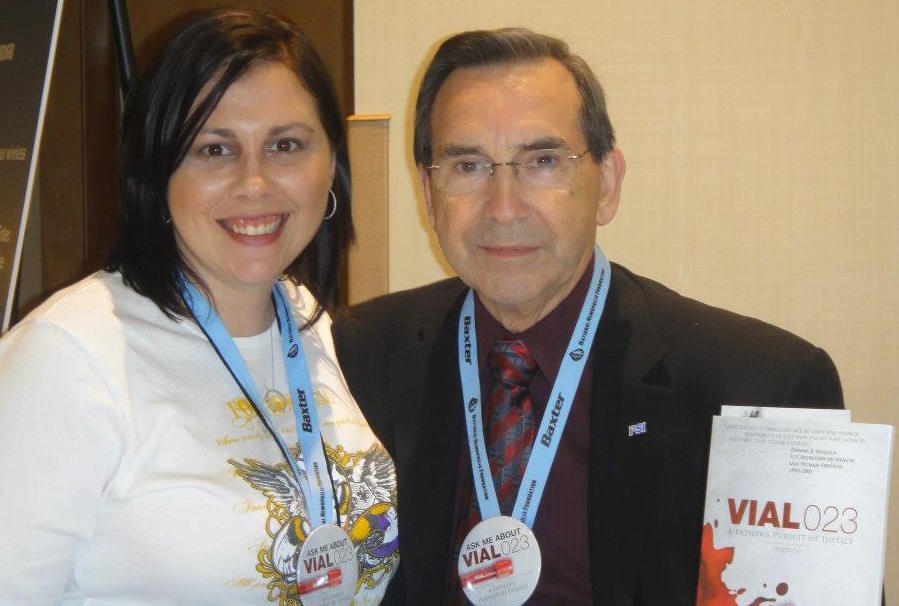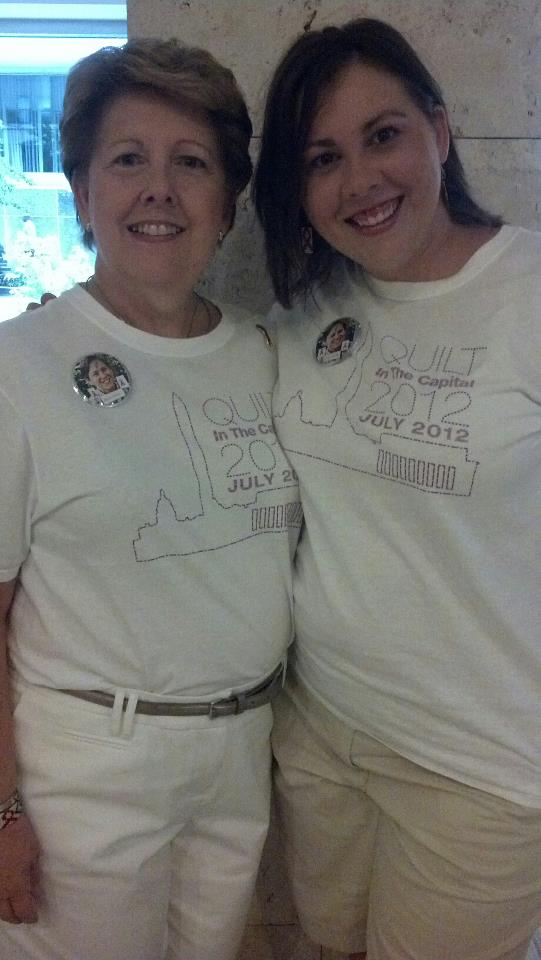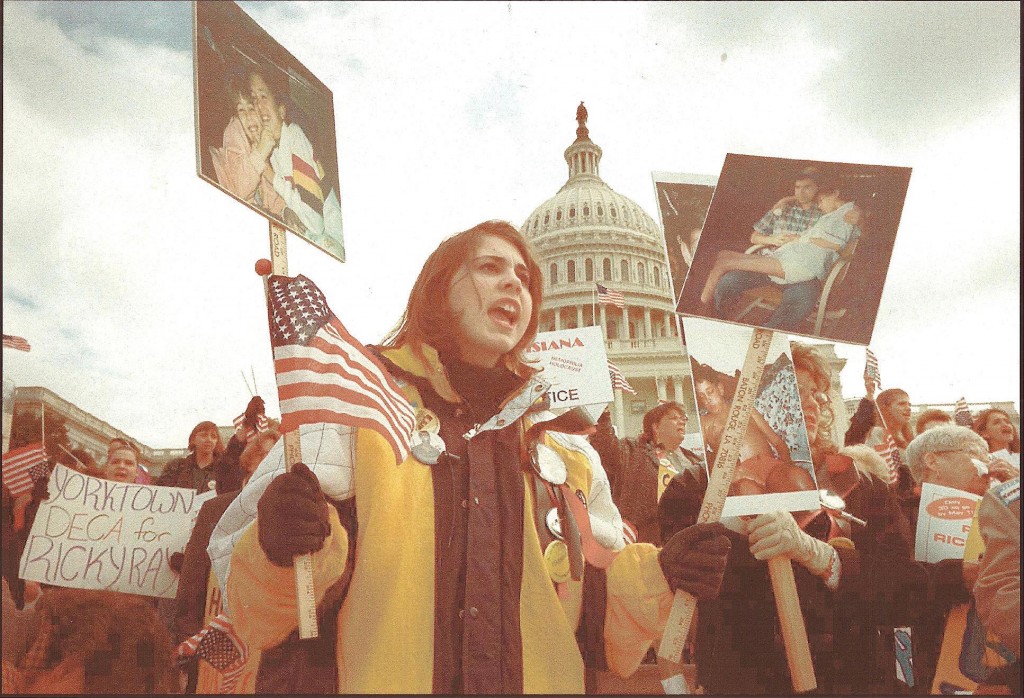Women Are Not Just Carriers
Jennifer and her father Gary during a book signing of, Vial 023: A Father's Pursuit of Justice
While some women experience bleeding symptoms monthly or even more frequently, other women may go years before bleeding issues are recognized, making a diagnosis even more difficult. Jennifer was a hemophilia carrier for 33 years before she had her first bleed. She shares the emotional and physical pain she endured as she struggled to get a proper diagnosis and treatment. Here is Jennifer’s story:
For 33 years I was just a hemophilia sibling and a carrier. Being a carrier never frightened me. I grew up around hemophiliacs. In fact, hemophilia didn't scare me until a year ago when I not so gracefully fell on my knee. I immediately knew something was wrong. That fall would change my life forever. The swelling just kept getting worse and elevation and ice weren’t helping. Even though it had been over 20 years since my brother's death from AIDS due to contaminated factor products, this seemed all too familiar.
As if having a bleed for the first time isn’t painful enough, I was bombarded with questions from people who don't understand how you can live 33 years without a bleed. I’ve always known I was a carrier with a low factor level. I have factor, but my body has to be reminded to make more and now that I'm older, sometimes it just can't make enough.
Females can and do have bleeding disorders. The type and severity of symptoms experienced by a female with a bleeding disorder depends upon the diagnosis and severity of the disorder. Some of the symptoms women may experience include:
- Heavy menstrual bleeding
- Frequent nosebleeds
- Prolonged bleeding following a dental procedure
- Post-partum bleeding (excessive bleeding after giving birth)
I went to an orthopedist who did x-rays but saw nothing to explain the pain and swelling. As it got worse, I thought, maybe it was a bleed. It was warm to the touch, pain was excruciating, swelling was starting to affect my thigh, but I had never had a bleed before. I got online and shared my experience and symptoms with hemophilia Facebook groups, family, and friends. Everything I described pointed to a bleed. My hematologist checked my factor level which was around 80%. He never touched my knee and only looked at it because I pulled my pants down in agony and frustration. After a couple weeks, the swelling and pain worsened. I called my hematologist to give me DDAVP to see if it would help. For four days I went to the outpatient center at a hospital and infused for 2-3 hours. After a week of DDAVP, the pain and swelling started to subside.
Jennifer with her mom, Karen
I realized that it would be helpful to visit my local HTC, so if I ever had another bleed I would be prepared. However, that turned into a horrible and incredibly shocking experience.
I knew my family wasn't exactly welcomed at the HTC since our participation in the lawsuit against the pharmaceutical companies and doctors in the 1980s. But I also felt this was a medical establishment with a sole purpose of treating hemophilia, I spent 6 hours in a room where I was visited by a social worker who asked me, “How do you think your life would be if your brother never had hemophilia?” I've been seeing therapists for over 25 years (I'm not ashamed of this) and I have never been asked that question. Then finally I saw the lead doctor instead of the head doctor, it was an intern. I had made this appointment 3 months in advance to see the hematologist and she wasn't there. No one had read my medical records. The intern didn't even physically examine me or touch my knee. Disappointment and confusion quickly turned to anger.
It took me three months of phone calls to get my blood work results. I was told by the nurse, not a doctor, that my factor level was 80% and I was therefore not a carrier of hemophilia. According to her I had no indications that I had any hemophilia issues. I didn't argue, I just hung up with disappointment, doubt, and major confusion.
I'm not good at math, but 80% factor level wasn't 100%. I've previously had levels ranging from 20%-70%. So how can a Hemophilia Treatment Center tell me I'm not a symptomatic carrier or even a carrier? I didn't realize at the time, but for some women, it is common for clotting factor levels to fluctuate.
One day going up the stairs led to my knee swelling for 4 months. After my first experience I knew I'd have to see the orthopedist first. At my appointment, he mentioned a possible torn meniscus and ordered an MRI. The MRI ruled out a tear and it was back to begging my hematologist for treatment. He called the HTC for recommendations and was told by the nurse, not the HTC hematologist, that I did not have any hemophilia factor issues and that they would not treat me for hemophilia. The emptiness and outrage I felt when he repeated that to me cannot be described.
I continued in horrific pain, with my entire leg now swollen. I decided to go to the ER and was finally prescribed a daily dose of DDAVP. I was using a walker because the pain and swelling was so severe.
Then my angel came to my rescue. She works in Utah and could be my doctor as long as a local doctor would agree with her treatment plan. Dr. Danielle Nance is not just a hematologist, she is also a female with hemophilia!
Jennifer advocating for the passage of the Ricky Ray Relief Act in the 1990s
When I brought this treatment plan to my local hematologist, he fired me as a patient. Yes, I got fired by a medical doctor during a health emergency. I had done nothing. I had not told him that I thought he was incompetent because I knew I needed him. I did not say a word when I sat in a wheelchair in his office with tears rolling down my face waiting for 3 hours to see him. I kept my anger, frustration, exhaustion, and painful thoughts to myself.
I went to my general practitioner hoping he would be willing to treat me. He had spoken to Dr. Nance and agreed with her recommendations but thought it best that my hematologist work with her. As we waited he called my “ex-hematologist.” My general practitioner told the hematologist he truly believed I was having a hemophilia bleed and that giving me factor could only help.
I was prescribed a factor product, had outpatient surgery to have a PICC line inserted, and began infusing for the next 4 weeks.
After the PICC line was removed, I visited Dr. Nance. I made some incredible friends that were female hemophiliacs. A year later, I have learned that I have severe arthritis and a bone spur in my knee as a result of not receiving the correct treatment. Of course I'm angry and really frustrated, but I'm hopeful. Hopeful, that by sharing my painful and extremely long journey it will spare even one person the pain and emotional roller coaster I endured.
There is a stigma that comes with chronic illnesses. You realize that with each setback, you miss the chance to do “normal” activities. It’s the realization that it’s no longer mind over body, but body over mind. It’s crucial that when you finally accept your illness that you accept there are going to be many days that you can't fight your body, you have to listen to it and do what needs to be done. It’s not a daily struggle, but rather a struggle every minute of every day. You have to learn to speak up and become your own advocate, because no one knows your body better than you.
“As women, we need to be vigilant, educated, and vocal about hemophilia.” – Jennifer Cross
This journey—this one bleed—it’s left me vulnerable. My heart aches with each step I take because I am full of fear that I’ll feel the dark pain again. I'm almost afraid to walk. I'm guarded in every movement.
As I reflect back on the journey of my first bleed, I am reminded of my legacy. A legacy that I have a responsibility to carry on. I wouldn't have felt safe receiving factor if it weren't for my parents, Dr. Dana Kuhn, Jan Hamilton, and others that took the steps necessary to allow me to receive clean blood products. I owe it to not just to them, but the thousands of hemophiliacs who continue to be advocates for the community. We need to be vigilant, educated, and vocal about hemophilia.
Jennifer Rhea Cross is a 34 year old freelance W]writer from Louisiana. Jennifer is the daughter of Gary W. Cross, author of Vial 023: A Father's Pursuit of Justice, and chairman of the PSI Board of Directors, and Karen Isaminger Cross. Jennifer is an advocate for hemophilia, AIDS, and chronic illness. She is a dog lover and Maltese enthusiast.










